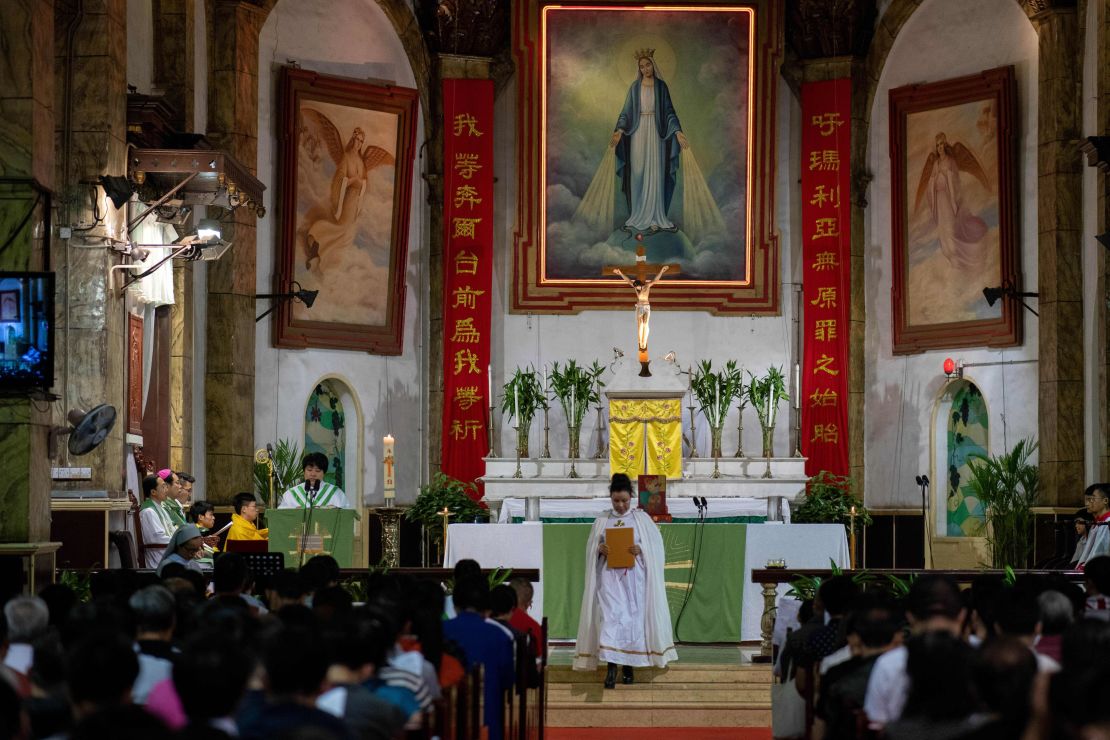A long-expected, controversial deal between the Chinese government and Catholic leaders in the Vatican has sparked opposition, including inside the Church itself.
The provisional agreement, which will see the Vatican recognize the legitimacy of bishops appointed by the Chinese government, comes at a time when the ruling Communist Party is cracking down on “illegal” Christian groups in the country.
Officially, there are about 6 million Catholics in China, although the real number could be more than twice that when counting followers in so-called underground, or unlicensed churches, according to a researcher with the Holy Spirit Study Center in Hong Kong.
The deal, which is part of Pope Francis’s vision to expand the Catholic Church’s following across the world, would help the Vatican gain access to potentially millions of converts across China, the world’s most populous nation.
But critics have questioned why the church, historically a defender of human rights and Christian values, would willingly join forces the increasingly authoritarian Chinese government, which is officially atheist.
Speaking to Reuters, Catholic Cardinal Joseph Zen of Hong Kong said the Church’s deal was an “incredible betrayal” and accused the Vatican of “giving the flock into the mouths of the wolves.”
Previously Chinese Catholic bishops in the state-sanctioned church were not appointed by the Pope, which had been a key sticking point between Beijing and the Vatican since relations broke down in 1951.
Amnesty International China Researcher Patrick Poon told CNN the agreement created serious concerns for freedom of religion in China in the future.
“Such an agreement will effectively set a very bad precedent for other religions (in China) … It will put Catholics under a lot of pressure,” he said.
While the details around the agreement remain vague, including who would have the final say on appointments, Chinese state media was effusive in its support for the proposal.
The Chinese Catholic Patriotic Association and Bishops’ Conference of the Catholic Church in China said in a statement in state media they “wholeheartedly supported” the deal.
But Father Bernardo Cervellera, editor of the Vatican news agency Asia News, said the reaction had been more muted among Chinese Catholics.
“There is on one hand a little bit of joy, because something is happening, there is a provisional agreement, but there is a lot of sadness because many problems remain open, above all the fact that many bishops have been disappeared at the hands of the police,” he told CNN.

Crackdown in China
The Catholic Church has a long and fractious history with the Chinese government, even before the founding of the People’s Republic of China in 1949.
Following’s Mao’s victory in the civil war, the Communist Party portrayed the Catholic Church as among the hostile forces responsible for the country’s decades of suffering and humiliation. There were even rumors, often discredited, of an assassination plot against Communist leaders involving a Catholic priest.
Even as relations have warmed over the past year, Chinese authorities have been cracking down on “illegal” religion across China, including multiple churches which have been torn down or vandalized.
“Activities in the illegally-built parishes will be prohibited,” an Ethnic and Religion Bureau official told the state media tabloid Global Times in April. “Other legal Christian activities will remain open.”
In April the Bible was pulled from sale in online marketplaces across China, including prominent shoping sites like JD.com and Amazon.cn.
Reports of crackdowns on underground Christian parishes in China continued into September, ahead of the announcement of the deal between Beijing and the Vatican.
In the United States, Republican Senator and frequent China critic Marco Rubio, himself Catholic, asked how the Vatican could justify the deal it had struck with the Communist Party.
“They are giving a government (an atheist one) influence in choosing bishops which (the Church says) are regarded as transmitters of the apostolic line. How does secular (and atheist) interference in that decision not break that line?” Rubio said on his official Twitter.
Father Cervellera said the Vatican had accepted if it wanted a deal it would have to work with the Chinese government on their terms.
“(The Vatican) starts this relationship from a very weak position, because the Vatican doesn’t have too many things to give to China (and) China is very powerful from an economic point of view, and a political point of view,” he said.
Concerns in Taiwan
The deal between the Vatican and Beijing is only provisional which means both sides still retain the ability to back out at any time.
The tentative approach isn’t surprising. Amid reports of resistance among factions on both sides, the deal appears to have been postponed or fallen through multiple times in the past year.
But it is the government in Taiwan who will have looked upon the newly-announced agreement with a particular degree of foreboding.
While Taiwan has been self-governed for almost 70 years following the end of the Chinese civil war, Beijing considers the island to be part of its territory, a breakaway province.
The Vatican is one of Taiwan’s last diplomatic allies and its most symbolically important one. In recent years, the Chinese Communist Party has been working fiercely to turn as many of the island’s former friends as possible, leaving them with only 17.
El Salvador was the latest to recognize Beijing and cut ties with Taiwan in August.
While experts have suggested formal diplomatic recognition of Beijing could still be a while away, the tentative deal will certainly provoke concern in Taipei.
“The Vatican has no scruples about abandoning Taiwan,” said Cardinal Zen, former Bishop of Hong Kong and a vocal critic of the Beijing government, told CNN in March.
CNN’s Steven Jiang and James Griffiths contributed to this article.




